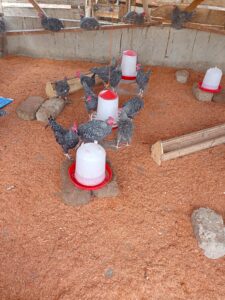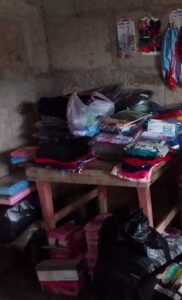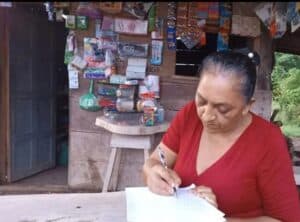
Innocent Sets Up a Home Garden to Help His Family Improve Their Nutrition
By Justice Amoka Sam – Community Crop and Livestock Specialist

Innocent and his family in their garden.
According to nutritionists, including vegetables and fruits in a diet can reduce the risk of some diseases. The COVID-19 pandemic poses a great threat to human health and all aspects of society, including food security. In addition to the individual measures that have been laid out to prevent the spread, people are also recommended to stay strong and healthy to be able to fight against the disease. The Ghanaian diet is largely made up of starchy roots and cereals like cassava, maize, and yam, which are all good sources of energy but lack essential vitamins that can help fight against diseases. The divide between food access in rural and urban communities is stark, and the most malnourished and vulnerable are usually women and children.
Self-Help International is working with rural communities to increase the cultivation and consumption of healthy and nutritious fruits and vegetables. The Agriculture and Entrepreneurship Development (AED) team offers rural communities vegetable and fruit garden training involving hands-on demonstrations and also supplies them with planting materials to start their gardens.
Innocent, an 11-year old boy who lives with his parents in Nkontomire, Ghana, is determined to promote the growing and consumption of vegetables and fruits in his community. Self-Help gave Innocent and his family hands-on training on vegetable and fruit gardening. Self-Help’s AED team also supplied Innocent with vegetable seeds and seedlings to start his garden to feed his family.
The family had land space around the house which mostly had plantain crops. Innocent, in his quest to start his garden, resorted to clearing a portion of the land occupied by plantain to create space for his garden. Self-Help’s AED team coached Innocent as he started his garden, and he currently has nine varieties of vegetables and fruits. When Self-Help’s staff asked Innocent what he was going to do with the vegetables in his garden, he said that he will make sure he eats some with his family and sells the remaining produce to buy clothes.

Innocent planting.
Innocent has started telling his friends about gardening at home and he assists those interested in preparing their backyard for a garden. He also links people to Self-Help’s home gardening project to start their gardens.
Innocent’s mother is very happy and supportive of the gardening project in her house. She said her son now wakes up with a sense of responsibility knowing that he has a garden to attend to, and she believes they will soon be eating from the garden. She believes her son will be very helpful to the community with the kind of good agricultural practices he is developing and will be able to share his knowledge with other families and farmers in Nkontomire.

 Previous Post
Previous Post Next Post
Next Post


